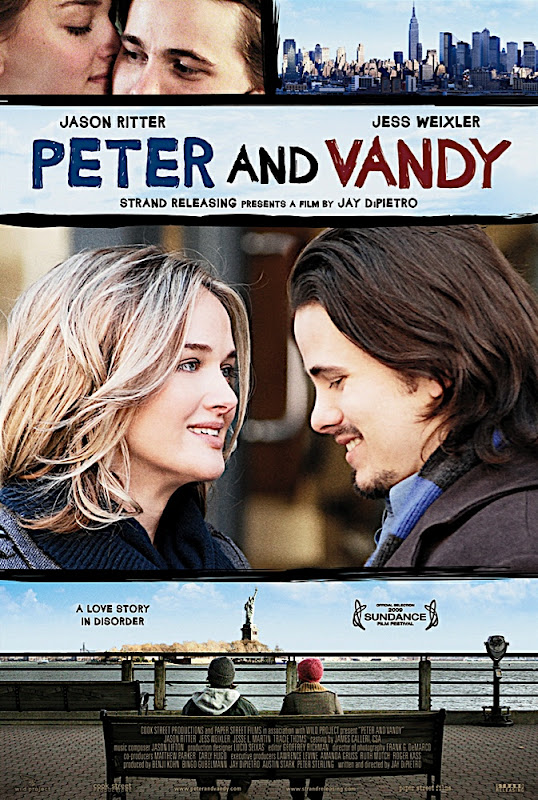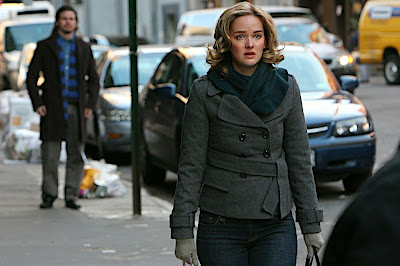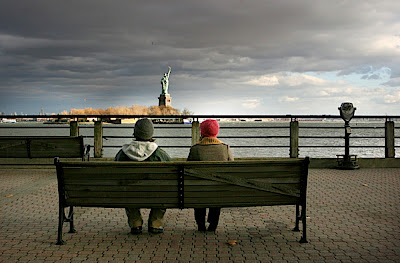Now Available to Own
For singletons, it used to be the grandmothers we'd have to worry about at key holiday events when inevitably we'd be put on the spot as to why we were sans a significant other. However, as Vandy (Jess Weixler) discovers in writer/director Jay DiPietro's film, children are not just inquisitive but also naturally gifted at the art of cross-examination.
Of course, most of us were already aware of their skill given children's “why?” phase and-- in my favorite example-- via the classic Macaulay Culkin/John Candy breakfast sequence in the John Hughes' charmer Uncle Buck but we're more prone to forgive a kid's blunt questions because they can plead the "adorable defense." So when Vandy's niece inquires as to why her long-term boyfriend Peter (Jason Ritter) isn't joining her for Thanksgiving, she ignores the protective instinct of other relatives to invent excuses or let her off the hook by answering her niece sweetly and honestly.
However, like most of us who stumble when faced with trying to pinpoint one exact reason a romance ended, Vandy is unable to give a solid explanation for why they're not together anymore, simply admitting that she doesn't know and she states aloud, “nobody did anything wrong.” And indeed since the Vandy in question is a movie character who comprises half of the central relationship in Peter and Vandy, given Julliard graduate Weixler's authentic performance as a bewildered lovelorn character, it makes sense that she'd still be reeling from the relationship.
Yet from the standpoint of a viewer, we shouldn't be as confused as the character we're watching on the screen. And this is especially the case because by this point in the movie we'd already experienced a substantial chunk of the nonlinear highlights and lowlights of their lives as a couple in the narratively challenging production. Thus, the filmmaking expectation should be that we would have a stronger insight into what went wrong. Unfortunately, while it's a fascinating premise in theory to view their relationship out of order, moving from bliss to boredom to acquire a unique perspective, the experimental approach employed by DiPietro's cinematic adaptation of his play only pushes us further away from even remotely identifying with either character.
Unlike the carefully plotted similarly nonlinear puzzle (500) Days of Summer which presents its “story about love that's not a love story” thesis from the start, the messy Vandy which had the misfortune of also competing against Marc Webb's superior movie at the Sundance Film Festival will most likely suffer by comparison theatrically since ticket buyers made (500) the sleeper hit of 2009.
Furthermore, Summer knew exactly where it wanted to go and how to take us there by using revelatory edits and rhythmic plotting to present the nonlinear time line in a way that made things clearer regarding early clues about what would go wrong, broken promises, and what made the couple spark in the first place. Yet by contrast since Vandy is purported to be a love story, sadly its freewheeling modern day revisionist approach on the French New Wave or Annie Hall often resembles rambling, incoherent chaos that loses its focus early on.
With his background as a playwright, DiPietro knows how to use subtlety well in foreshadowing what's to come and taking risks by making it hyper-real instead of real since nobody wants to view a work wherein characters just shout at each other in ways that would hit far too close to home. Sadly, Vandy still suffers because his decisions as to what to show them fighting about tend to kill that nice subtlety by their outrageousness. This is especially apparent in the endlessly analyzed “PB & J Fight” wherein Peter becomes so enraged that Vandy uses two knives to make a sandwich for him that he takes over and the scene goes from ludicrously comic to alarmingly close to violence.
Of course I do applaud DiPietro's attempt to avoid just launching into a primal shouting match by exploring our tendency as humans to fixate on one thing to avoid talking about something far more serious in theory. Yet this example goes to the detestable extreme regarding our main male character who until then had-- similar to Vandy-- been mostly guilty of a tendency to bitch at others or rely on passive aggressive nitpicking. So instead of introspective art, the PB & J freak-out was the straw that broke the already confusing and irritatingly solipsistic film's back.
Additionally, the random structure of cuts that don't quite feel like they're at all meaningful make us constantly wonder just where we are in the time line and furthermore, if we even care enough to question it. Thus, in stark contrast to the talent of the film's cast, in the end the movie just added greater evidence to our initial judgments of both Peter and Vandy as completely incompatible individuals whom we actually wanted to break up, although they don't have to worry that we'll ask them about it at holiday functions.
Text ©2009, Film Intuition, LLC; All Rights Reserved. http://www.filmintuition.com
Unauthorized Reproduction or Publication Elsewhere is Strictly Prohibited.






















